Text
PIC CINEMA !! <3

Byler is Narrative Destiny:
Decoding Mike and Will’s (rather obvious) love story
Alternative title: Subtext My Ass
Just an unapologetically nerdy breakdown of Mike and Will through colour psychology, symbolism, and Jungian Archetypes to eviscerate any remaining Byler doubt that may be out there. Mike and Will have been (quite literally) written for each other. Let me prove it.

The psychological significance of red, yellow and blue:
Let's start with the basics.
Mike's representative colour is blue, and Will's colour is yellow.
Blue is the colour of Mike's bedroom and most of the clothing he wears features various shades of blue, as well as green and teal (which are secondary and tertiary colours from blue).

And, although I wouldn't die on this hill, I do think Mike's palette could function as subtle queer-coding as it resembles the gay flag.

Yellow is the colour of Will's bedrooms in both Hawkins and Lenora. He often wears yellow and pairs it with red.
(Interestingly, the only season where Will does not wear these colours as often is season 2, when he is possessed by the Mind Flayer).

And of course, potential queer-coding with red and yellow both being 2 of 3 primary colours featured on the generic rainbow pride flag. Will's wardrobe in general is very colourful.

Unlike Mike's palette which features secondary and tertiary colours, Will's red and yellow are both primary colours. They are very distinct and especially striking when paired together.
Therefore, red should be given equal focus to yellow when we analyze Will's character design and the associated psychology of his character.
I argue that red is Will's other representative colour, because he is psychologically split.
Will having two distinct representative colours makes a lot of sense when we remember that he is constantly associated with split imagery.
This split imagery is usually portrayed using rods or other phallic-shaped objects.
The show is telling us visually that there are two sides to Will Byers, and because the imagery is phallic, it likely has something to do with his sexuality.

When I see rods, I'm reminded of the Suit of Wands in Tarot.
Tarot uses symbolism, semiotics and numerology to communicate meaning. The wands in tarot are rod-like and traditionally depicted as sticks or branches. They are phallic symbols; representing passion, lust, and vitality, as well as the element of fire.

These are all things we subconsiously associate with the colour red, too!
So, let's take a closer look at colour psychology, starting with red!
Red exudes passion: love, energy, excitement.
It makes sense.
Red is the colour Will used for Mike's heart emblem painted on his shield. (Accompanied by a yellow crown).
Red represents Will's passionate love for Mike.

Not innocent or platonic love, but a mature, sexual and romantic love. The kind a closeted gay teen in the 80s might be terrified of.
What's more interesting is that even though red and yellow are Will’s colors, he projects them onto Mike in this paiting. Likewise, blue is Mike's colour, but Will assigns it to himself through the spell he's casting. Figuratively, casting a spell refers to strongly attracting, enchanting or captivating someone.
The meaning here is twofold:
Mike is attracted to Will, and feels that he is a forbidden temptation or even a seducer (more on that later).
Will knows (or rather, feels) that the attraction is mutual on a subconscious level, even though he may logically believe this not to be true.
The imagery in Will's painting reminds me of the official artwork in which Will is casting a blue lightening bolt spell, which connects to Mike's shield featuring the red heart.
Red and blue are also the only colours depicted in this image. They are clearly significant when paired together. (Perhaps more significant than yellow and blue...)

Red also represents Will's latent manhood (and subverted masculinity).
We associate red with fire, and by extention, with gun-powder.
Will the Wise is a wizard, and wizards cast fireballs—but he hesitates to cast it. Will also literally wields a gun—but he never pulls the trigger.
(At least, he doesn't fire it in the canon of the show. Like the fireball however, Will may have eventually pulled the trigger, as depicted in the comics). When Will does shoot the gun in the comics, he does so while closing his eyes and looking away, meaning that it is unlike him or "feels wrong."

In a symbolic sense, the fireballs and gun (which is phallic) represent masculinity, aggression, and agency.
Will is hesitant to embrace them all.
And the thing is, Will's gentle and slightly more effeminate nature (at least by 80s standards) is a perfectly valid expression. There is a distinction between masculinty and manhood: Manhood is simply the sexual and psychological maturity of an adult man, as compared to that of a child (boyhood). Like how red represents Will's mature love for Mike, it could also be foreshadowing of his coming-of-age. There's no need for him to "toughen up" or act "manly" in order for him to step into his manhood. Rather, he will likely do so by reclaiming his agency.
Will is going to symbolically embrace his manhood by:
Accepting his sexuality and coming out (at least to people he trusts, because it's not everyone's business).
His emancipation from the influences of the Mind Flayer, Vecna and Lonnie (malevolent forces which represent shame, trauma and domination).
Now, let's move on to Will's (apparently) more dominant representative colour.
Yellow exudes innocence: creativity, happiness, optimism.
Will is often percieved as innocent and more child-like than the other party members, despite his advanced emotional maturity.
He wears a lot of yellow (and plaid) to represent this innocence and youthfulness.
Yellow represents Will's innocence.
According to the casting director, Will was casted to appear young and innocent, and also for his large, expressive eyes. Wide eyes (or doe eyes) are associated with innocence, children and prey animals. Will also visually resembles prey animals such as rabbits and deer.
Before he is abducted, Will appears as a metaphorical deer caught in headlights.
(The light is on him when it should be on the demogorgon. He is the prey here).

Yellow also represents Will's artistic sensibilities.
Even though some of the images depict violence, Will's drawings still exude childhood innocence and wonder: they are colouful, whimsical and fantastical.
They also represent optimism and friendship, which is very yellow-like. His drawings appear to be inspired by the antics of the party's campaigns, depicting triumph rather than tragedy.
(Mind Flayer and Zombie Boy drawings aside).

Yellow is associated with Will's halo imagery (and other religious symbolism).
When we see Will from Mike’s perspective, he is bathed in yellow light.
It’s halo imagery—and it provides a stark contrast to the split phallic imagery we get from Will's own perspecitve.
(It's worth asking, since this is Will from Mike's perspective, does it really say much about Will's psyche? Or does it point more towards Mike's own psyche?)

Light signifies optimism, hope and clarity.
A halo specifically sybmolises holiness, purity and martyrdom.
This relates strongly to Will's role as cleric (a class who use divine magic gifted by deities, which is often depicted as golden or yellow). The thing is, Will the Wise is actually a wizard. It was Mike who determined Will was a cleric in season 2. Mike seemingly placed Will into this role, because it fits how he views him.
Additionally, Will's role as spy for Vecna and his "True Sight" can be associated to yellow.
When we see a single eye, it usually signifies the all-seeing eye, also called the Eye of Providence.
The Eye of Providence is typically depicted emanating golden yellow rays of light. It's more religious symbolism connected to Will.

But this is not a positive thing for Will—it's connected to his abduction, possession and subjugation.
Mike's halo-ifying of Will tells us that he views Will as something angelic: pure, divine and holy. But Will does not percieve himself this way at all. Will is less concerned with the religious symbolism and more concerned with the phallic. To put it bluntly, Will is not as innocent as he appears, and is thinking more about his sexuality and desire than people realize.
Finally, yellow is associated with Will's metaphorical death.
Will's funeral is littered with yellow roses, and through the liturgical prayer (more religious coding) he is again directly tied to innocence.

We now have an association between yellow, innocence, and death.
Let me decode this very simply:
Child = innocence Death = loss A child's death = the symbolic loss of innocence. So even though Will lives, he lost his childhood innocence when he metaphorically died.
I hope that I've been able to get the point across that although yellow fits many aspects of Will's personality, it also seems tied to his repression and stasis.
Psychologically and narratively, yellow does not indicate growth for Will's character, in the way that red does.
Now, let's move onto one of the most tragically misunderstood characters in the series and his representative colour.
Blue exudes sincerity: loyalty, stability and trust.
This is the absolute epitome of Mike.
Mike is incredibly loyal, often even to his own detriment. Everytime Mike does a wrong, he always strives to make a right. In fact, he's prone to taking ownership of things that aren't his actual fault or responsibility. He's also deeply compassionate and determined to do everything he can to help others.

Blue represents Mike's leadership capabilities.
In marketing, brands will often choose the colour blue to subliminally communicate that they are dependable, trustworthy, and leaders of industry.
Mike is also a natural leader: he has played as both Dungeon Master and paladin, he initiated the efforts to find Will among his friends, and he took El under his wing. And this is just in season 1 alone.
He continues to protect and guide his friends through-out the series, using his sharp wit and intelligence (over brute strength) to problem-solve.
Mike's leadership is not based in ego, it's a genuine psychological need. It's where he fits into the world: helping, protecting and guiding others. It's natural for him.
Once again I look to the Tarot, and this time the Suit of Cups.
This suit represents the element of water, representing the inner world, emotions and spirituality. The cups themselves are symbols of fulfillment: is the cup empty or full?
I think we should ask the same question when we look at Mike. Is he empty or full? What is it that he actually wants? Are his needs being met?

The colour blue is associated to water, symbolising the unconscious, emotion and hidden depths.
Blue represents Mike's hidden depths (and his unmet fulfillment).
Mike is associated with water, too. In a very literal sense. He jumped into the quarry to save his friend, likely knowing it would kill him.
(And note that his jacket matches the blue-green colour of the quarry water).

Why did he do this? Was it truly just to save Dustin, or is there more here hidden beneath the surface? Much like Will's experience in the Upside Down, Mike's jumping into the quarry is never explicitly addressed. He never talks about it, and it's never explained.
This implies repression, both emotional and psychological. There is a hidden pain and depth to Mike, that is beneath the surface. He's like still water.
In both Jungian and Freudian psychology, water is associated with the unconscious. And in Stranger Things, water facilitates the transition from unconscious to conscious.
When El has to recover her repressed memories of Hawkins Laboratory, she does so while floating in water. In fact, she uses water to infiltrate other people's consciousness, too: entering their private memories. When Heather begs El for help (though she was already possessed by the Mind Flayer) she is also submerged in water. This was a message from her subconscious, which was repressed by the Mind Flayer.

Mike never becomes submerged into the water, however. In the literal sense this is a relief. But metaphorically, it's a problem. Like Will's metaphorical death at the quarry, Mike is also in a state of stasis.
Mike needs to transition his unconscious to the conscious in order to be emotionally and psychologically fulfilled.
There is no wonder why people often find Mike's character to be confusing or amorphous: he has been intentionally written to be this way.
We as the audience are supposed to experience his struggle with identity, purpose and fulfillment along with him. We're meant to feel his confusion. The story of Stranger Things is (largely) told from Mike's perspective—he's a writer and storyteller after all—and he's hiding the things about himself he does not yet want us to know, because he still needs to deal with them himself.
Okay, I hope you're still with me, because we're getting to the crux of it now.
The Jungian Archetypes:
Now that we've explored how Mike and Will's representative colours (and associated symbolism) reflect their inner worlds and personalities, we have enough information to identify their most prominent Jungian Archetypes (including their shadows).
Jungian Archetypes are often referred to as Character Archetypes or Literary Archetypes. Sometimes, this is why an ending feels “right” or inevitable. When we understand the characters, we already know on a gut level what kind of ending they will get. In way, it's a form of predictive modelling for storytelling.
Will as the Lover archetype:
If red represents Will's passion, love, and lust, then that makes him the Lover.
The Lover archetype is passionate, romantic, and driven by a desire for deep connection. Alongside the Everyman, the Lover belongs to a trio of archetypes that seek belonging above all else. Specifically, the Lover seeks both emotional and physical intimacy.
They are empathetic and sensual, and I think this relates to Will's deep appreciation for music and art. He's also very in-tune with his own (and other's) emotions, especially Mike's.

(This is the deep, sensuous gaze of the Lover. There's nothing "innocent" about it. He is drinking Mike in, and he's not shy about it).
Again, I reiterate that Will is not as innocent as he appears. When we are placed in his perspective, it's love and intimacy that he most craves. It's phallic imagery that we see. He's no longer a doe-eyed child; he's a young man with emotional needs.
It's worth noting that based off his characterization (sensitive, romantic, selfless and handsome), Will would probably be portrayed as a romantic leading man if he were straight. The one who "gets the girl."
He's Colonel Brandon (Sense and Sensibility). He's Jack Dawson (Titanic).
The Lover's Shadow
The Lover's Shadow-self may be referred to as the Addict or the Seducer.
The Addict or Seducer is hedonistic: They prioritize external validation over genuine connection, and crave temporary gratification. Will is not portrayed as hedonistic, meaning he is sitting quite firmly in the light aspect of his archetype rather than the shadow.
It suits him. It's his endgame.
However, the Seducer certainly invokes the imagery of Will being a spell-caster: one who can enchant others, even against their will.
Perhaps this is Mike's subconscious perspective: Mike feels that Will is tempting him and seducing him into queerness. Was Will Mike's sexual/ gay awakening? It's very possible.
Alternatively, this could represent Will's own subconscious fear regarding his sexuality, considering the attitudes towards gay men at the time: Will fears that he will become a sexual deviant, that his love is impure, and will lead Mike down a path of sin.

Very compelling stuff. Let's take a look at Will's other Jungian Archetype.
Will as the Innocent archetype:
The Innocent is pure, optimistic and hopeful. What they seek most is harmony and safety, and they choose to see the goodness in others.
They represent the desire to return to childhood. It makes sense that a character who had his childhood stolen from him due to trauma, and who has sexual identity issues, would project as the Innocent archetype. However, I think the Light aspect of the Innocent archetype fits better with younger Will (seasons 1-2), than with teenaged Will.
This is why I think Will uses the Innocent as his Persona (projection).
The Innocent's Shadow
The Innocent's Shadow-self is the Victim.
They are naive, vulnerable and easily-manipulated. The Victim embodies the feelings of powerlessness and helplessness.

It's certainly reminiscent of Will's continual misfortune.
From his father's abuse, his abduction and possession, to his "unrequited" love for Mike, Will has been perpetually victimized through-out Stranger Things.
As far as the Innocent goes, Will is sitting more firmly in it's shadow than in it's light.
But Will is not naive, and he's too "wise" to be easily-manipulated. I think Will has partially out-grown his innocent image, or rather, the version of innocence he is attached to (sexless, childish and victimized). Will is going evolve into a more mature (and self-possessed) version of the Innocent: optimistic, wise, and hopeful. He'll achieve this by leaning more into his Lover archetype, which will facilitate his coming-of-age.
Mike as the Everyman archetype:
The Everyman is the protagonist. They are relatable and down-to-earth. They don’t display any outward powers or extraordinary gifts, but they are humble, compassionate, and kind.
Alongside the Lover, they seek belonging above all else. For the Everyman specifically, this belonging centres around community (friendship).
Mike is certainly the Everyman.
There is nothing more important to him than his friends.
His role as the Everyman also makes sense when we remember he's the primary narrator of the story. He's the ordinary boy who is thrust into extraordinary circumstances.
He's constantly in awe of those around him: El's superpowers, Will's light and "innocence." The Everyman often mistakenly believes they are unimportant. They are too normal, while the other characters around them appear so much more distinct and larger than life.

Because the Everyman is usually so caught up in trying to figure everybody else out, they tend to neglect their own sense of self.
But the Everyman is an extremely important character: they ground the story in reality, bring people together and find common ground.
The Everyman is the heart of the story.

The Everyman's Shadow
The Everyman's shadow is the Conformist or the Nobody.
Oh, yeah. We're going there Wheeler.
The Conformist possesses a fear of standing out or taking risks, and assumes socially acceptable identities because they're afraid to dissapoint or subvert expectations. In simple terms, they are repressed.
(Would anyone like a serving of compulsary heterosexuality? Mike's teeming with it).
Speaking of Mike's repressed perspective and subconscious state: Remember his simultaneous halo-ifying of Will and characterization of him as a seducer?
That's deeply psychological too.
This is what his halo-ifying of Will reveals about his pscyhe:
Mike's tendency to place others above himself
Mike's repressed sexuality: viewing Will as something both untouchable and unattainable.
He has decided to view Will as fully Innocent (to the most spiritual degree) as a means of rationalizing his sexual repression. You can't get with the guy who wears a literal halo! That would be… sacrilegious! The religious symbolism surrounding Will may actually stem from Mike's unreliable narration and conflicted feelings about queerness.
This is what Mike's view of Will as a spell-caster/ seducer reveals:
Mike feels that he’s been enchanted or bewitched by him.
He frames his desire as something external to himself. Something being done to him, because acknowledging that it originates within would mean facing his own queerness.
Mike is in his Conformist mode, and he's going to break out of it by the end of season 5.
That's not all though, there's also the Nobody.
The Nobody feels invisible and insignificant. They often lack ambition, and have feelings of inadequacy and low self-esteem.
This also sounds familiar.

And yeah, the fact that when Mike is in his shadow he chooses to confide in Will, and Will is the one who helps him step into his light should not be lost on us.
Will sees Mike's worth as the Everyman: the heart of the story.
He is the Everyman's Lover.
There's more to Mike, though. Like Will, he embodies a secondary archetype.
Mike as the Caregiver archetype:
The Caregiver is characterized by compassion, generosity, and a deep-seated desire to help others. Driven by a need to nurture and protect, they often prioritize the needs of others above their own.
They are motivated by structure and order; wanting to maintain the status quo, safety and familiarity.
Mike shows up as the Caregiver frequently. He is always protecting, comforting and safeguarding others, particularly those he sees as most vulnerable or in need of his service: Will and El.

While the Everyman pairs nicely with Mike's role as the narrator and protagonist, the Caregiver pairs with his role as leader. He's not a ruler; authorative, noble and intimidating. That's not his style of leadership. Instead, he's something softer. He leads by example: protecting, healing and serving.
The Caregiver's Shadow
The Caregiver's shadow may be called the Slave or the Enabler.
This emerges when when caregiving becomes self-sacrificing to an unhealthy degree, or when it's rooted in control, guilt, or dependency.
It's the incessant need to be needed, to any end.

Mike needlessly makes a promise to El that he will fix a problem he has no control over, and he breaks that promise because El fixed it herself.
Why does he do this?
Because he feels that it has to be his responsibility, even though he understands that El does not "need" him. This fills him with feelings of guilt and inadequacy, and validates his insecurities. It's very different to Mike's emotional support and compassion which he shows El in the earlier seasons. When Mike and El are dating, his Caregiver self is placed in the shadow: making him insecure, needy, and guilt-ridden.
Now, we approach the climax: Byler's compatibility.
Compatability:
Mike and Will are narratively (and psychologically) compatible, according to their individual character arcs and archetypes.
The Lover and the Everyman
The Lover enchants the Everyman: making them feel special, and convincing them to embrace their emotional and romantic needs, which inspires them to be active and bold instead of hesitant or repressed. The Everyman grounds the Lover: providing them clarity, stability, and a love which is based in sincerity and deep understanding, rather than physical or sexual validation.

Will enchants Mike by making him feel special and worthy of love, and Mike literally brings Will back to reality through his sincerity.
The Innocent and the Caregiver
Is this one not obvious?
The Innocent inspires the Caregiver: reminding them that there is good in the world worth protecting, making their servitude meaningful, rather than sacrificial. (Hello lotr reference! Mike and Will are extremely Samwise and Frodo coded). The Caregiver protects the Innocent: validating their optimism and sharing in their desire for safety, never making them feel stupid or burdensome.

Mike is inspired into action by Will's goodness, and Will confides in Mike as he trusts him to understand and validate him.
Finally, we've reached the conclusion!
The (predictive) endgames:
If characters have archetypical personalities and motivations, then they also have archetypical narratives. That is to say, we can predict the end of their story so long as we just pay attention.
Let me make something clear:
You don't depict someone as the Lover, and have them pine, without giving them their satisfying love story.
You don't depcit someone as the Innocent, and have them continually suffer, without giving them their peaceful ending.
You don't depict someone as the Everyman, who conforms and retreats into shadows, without having them surprise and subvert audience expectations.
You don't depict someone as the Caregiver, who sacrifices and gives, without having their efforts be appreciated and acknowledged.
Some stories do have sad endings, and our protagonists don't always get what they want, or end the story fulfilled. But allow me to remind you:
Stranger Things is a hopeful story about unlikely heroes (outcasts, rejects and non-conformists) beating the odds.
The characters don't just fight literal monsters, they fight metaphorical monsters that represent bullies, abusers and bigots.
The ending of the show may be bittersweet, but Will and Mike are sympathetic characters with good hearts, who deserve their happy endings.
My prediction is simple:
Will the Lover is destined for romantic union with his beloved, Mike. Mike the Everyman is on a path to embracing his true, authentic self. Will the Innocent will finally find safety, and freedom from represison and abuse. Mike the Caregiver will lead and protect with his greatest asset: his heart.
Mike is not just the narrator of this story, he's the heart of it.
And Will just so happens to be his heart.
It all comes down to them, and the show already foreshadowed it:

[fin].
#stranger things#byler#mike wheeler#byler endgame#will byers#stranger things 5#st5#byler evidence#byler nation#mike x will#will x mike#byler analysis#byler is canon#color theory#writing#writing archetype#archetypes
768 notes
·
View notes
Text
I LOVE this one ! ^^
Absolutely crazy that Mike and El both concocted this perfect version of the other in their heads during the time they were separated, between S1 and S2.
Mike likely created someone to talk to, someone he could tell everything to without judgement. He found comfort in this quiet, listening, understanding version of El.
El, on the other hand, made up someone based on the romance shows she watched, where the characters displayed pure unconditional care for each other. She created someone who loved her for who she was and didn't care about her past or powers.
Unfortunately when they got together, they tried to keep up this facade and it all exploded in their faces.
The real El doesn't talk to Mike and vice versa about their interests, or fears, or anything.
The real Mike obviously cares, but not in the way El wants. He's always mentioning her powers in some way and reminding her of her past.
Just my thoughts though!
I might add more but here it is for noww
#byler endgame#byler#mike wheeler#mike wheeler i know what you are#el hopper#elmike#platonic mileven
280 notes
·
View notes
Text
Was the Vanishing of Will Byers REALLY the inciting incident of Stranger Things?
a character analysis feat. your boy Mike Wheeler
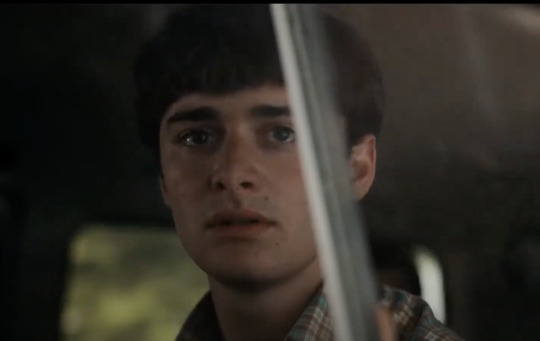
I’m reading Story by Robert McKee, a book about screenwriting. The author describes Inciting Incidents - events that set a story in motion. Isn’t this something byler v. mileven fans always argue about? Was it Will’s disappearance, or El sending Henry into another dimension, that is the Inciting Incident of Stranger Things?
Seems pretty obvious, but let’s break it down for fun.
The screenwriting book lists the prerequisites for an Inciting Incident. It is the first in a series of story events, followed by Progressive Complications (ooh!) Crisis (ah!), Climax (OMG!), and Resolution (phew).
Sorry, I'm afraid I won't be taking questions on the genuine academic theory that classical story structure resembles the male orgasm at this time.
According to my man Robert McKee...
1. The inciting incident radically upsets the balance of forces in the protagonist’s life. It must happen to the protagonist, or be caused by them.
So I suppose for many who think El is the main character, then her sending Henry packing into another dimension could technically work on this point. She actively changes the narrative.
2. The main prerogative of the protagonist is, as a result, to restore balance to how things were before the Inciting Incident happened (they may or may not achieve this).
Well, what would this mean for El? Would she want to resurrect Henry, then? Bring him back into the Rightside Up? What has been her aim, her quest, throughout the course of the show?
3. The inciting incident must happen on screen for the audience to see.
Well, we do see it, but only in flashback, many seasons after the story has begun. It seems like El yeeting VH1 to hell is instead what's known as Backstory.
Backstory describes events prior to the main narrative which influence future events, and is often shown in flashback.
4. The Inciting Incident must occur within the first 25% of your story. To find their Inciting Incident, a writer should ask themselves: how do I set my story into action?
Ah.
El sending Henry into the Upside Down cannot be the Inciting Incident, because it does not do what all Inciting Incidents must do: make the audience ask that million dollar question:
‘How the fuck is this gonna turn out, then?’
This is known as the Major Dramatic Question. It is the hook that makes the audience want to watch, planting in their mind what is known as the Obligatory Scene (or Crisis), an event the audience knows it must see before the story can be done.
It’s important to note that stories are about the extremity of the human condition. They push characters to the very limits of their possible experience, on the axis of a value, reaching the highest highs and the lowest lows. What might the value of Stranger Things be? All stories have one overarching main value, even if they have many smaller values. I think it might be Freedom/Slavery, or Truth/Lies. More on this later.
Now, if your story is a happy ending (called Idealist), the Inciting Incident might be the worst possible thing that could happen to your protagonist, a negative on the value axis, with the following story then being why it turns out to in fact be the best thing for them. Tragedy is the opposite - a great turn of events turns out to be their downfall - and an Ironic ending is bittersweet, stretching the protagonist many times between joy and tragedy, over and over, until the ending rests at a place of both happiness and sadness.
Was El sending Henry into another dimension the best or worst thing that ever happened to her? Was it THE original incident that upset the balance of her life and set her story in motion? And what would be the Obligatory Scene that results, the thing the audience just NEEDS to see before the story is done?
Many argue it’s seeing El defeat Henry for good. Sure, this is an intriguing idea, and we do need to see El's plot tied up.
But is this the greatest mystery of Stranger Things that we need answered? Really? I don’t think so. It was not the event we saw at the start of the story that set things in motion, because this particular cast of characters would not necessarily have even met El if one thing hadn’t happened.
What is the thing the audience has always been dying to know about Stranger Things? What is the Obligatory Scene the story must provide us before it can end? The thing that never quite made sense?
How, and why, Will Byers went missing.
"But El has so much screen time! She’s so bold and active! A true protagonist!" the people shout.
Well, of course we don’t have the missing puzzle piece yet. If ST is treated as one large story, then s1 would be the Inciting Incident and Progressive Complications...
... s2-s3 Progressive Complications...
... s4 Progressive Complications and Crisis...
...s5 ongoing Crisis and Resolution.
It’s also an ensemble show, with many subplots that expand off of one Inciting Incident. Will going missing is, for example, also the Inciting Incident for another beloved character.
Guess who.
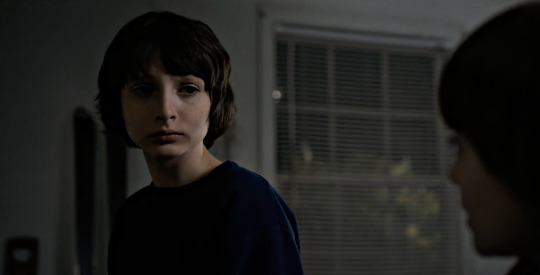
Hi Mike :)
Will going missing is an event that happens to Mike. It upsets the balance of his life and his quest becomes about restoring that balance by saving his best friend.
But by the end of s4, Will is still not safe.
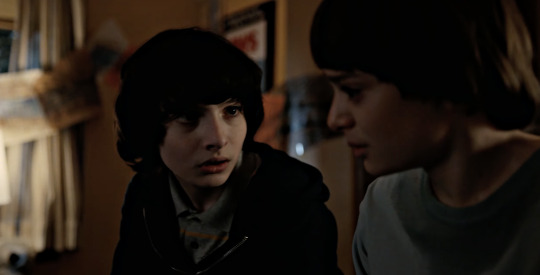
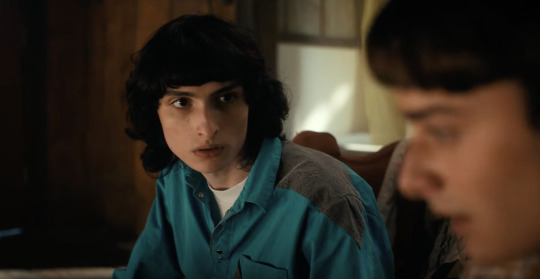
Mike still has not saved him - not really. A huge part of Mike’s quest is incomplete.
So where does Mike lie on the value spectrum of Freedom/Slavery at this point in the story? (Note that the concept of slavery is contextually appropriate, meaning 'trapped or controlled' here).
Mike's early narrative values were mostly external: having fun playing DnD with friends = positive freedom. His mom cuts their game short = negative, controlled. He isn't allowed to search for Will = double negative. Then later, Mike’s story becomes more internal and complex, with Freedom/Slavery coming to represent his place in society and inner battles in a subtle subplot. He breaks free by playing DnD, but is then trapped by his idea of being a good boyfriend, and so forth as we progress into s4.
But the very best stories push to the limits of human experience. They go beyond the positive and negative, and reach a double negative, what McKee in his book calls the Negation of the Negation. What could this be for Mike on the value of Freedom/Slavery or Truth/Lies?
Slavery masquerading as freedom, and denial - lying not only to others, but to oneself.
Mike comes from a seemingly perfect middle class suburban conservative family. It's the definition of white picket fence America. Everyone should, technically, be happy - but they aren't. If Mike continues down this road of normality, he could end up in a life where he tricks himself into thinking he has everything, but is actually in denial.
And what about Will? What’s his quest? Was being taken - his Inciting Incident - the worst thing that ever happened to him? Surely it wasn’t the best. On the value axis of Freedom/Slavery, he was captured - a negative value. If Will’s story is not to be a tragedy, his quest must be about how his vanishing will turn out to be something good in the end. And as Stranger Things will be a bittersweet (Ironic) ending, this Inciting Incident will turn out to bring both happiness and pain for Will.
So in what way could going missing have been a blessing in disguise for Will, allowing him opportunity for growth? What positive values could come about on the potential axes of Freedom/Slavery and Truth/Lies?
Will is enslaved by his secret - his sexuality - as well as by the shameful trauma inflicted on him by the creatures of the Upside Down, a possible metaphor for abuse. He experiences brief moments of freedom - positive value - when he is rescued, when he plays with his friends, and when he escapes the supernatural in California, but his sexuality secret remains - negative value.
But what is the Negation of the Negation for Will?
It's remarkably connected to what Vecna's ultimate goal is. Vecna wants to control the world, forcing people to live under a tyranny that he deems ideal, even if no one else wants it. He apparently wants to free people, but all he would be doing is enslaving them.
For Will, slavery masquerading as freedom could take the shape of Vecna trying to manipulate him into joining him, forcing Will to live in a form of denial where he accepts he can never have the freedom he craves.
Now, it’s important to note that while Will is a seemingly passive protagonist, he is in fact not passive at all, because his actions and choices have profound effects on the narrative (such as the painting lie, his choice to fight back against the Mindflayer in s2, etc), making him an active character.
And this is when I came across something very interesting in my screenwriting craft book.
A film called Ordinary People was mentioned. It’s a social drama about a family with a dark secret. The son has psychiatric problems and is freshly home from hospital. His mother is cold and resentful towards him, and his father is the passive, kindly man who wants everything to be right. There are two plots: the central plot, and the subplot. But the two are often mistaken.
People think the main plot is about the mentally unwell son, who has been despairing ever since the death of his brother in a boating accident.
His story is action-driven and draws the audience's eye with big emotion, a plotline given more screen time and more emphasis, leading people to think it is the crux of the story.
But the main plot, the central plot, actually belongs to the father - quiet and seemingly passive, he is the spine of the story. And because he is so quiet, the writer chose to do something highly unusual: to build the main dynamic of the film around the subplot, foregrounding the young son’s despair at the loss of his brother and how this rends the family apart, while subtly increasing the momentum of the main central plot in the background; that of the father figuring out what actually caused his family to fall apart.
I won’t spoil Ordinary People for you. But I found it very interesting when my hunch was confirmed and I found that this movie, this simple domestic social drama, was included on the Duffers brothers’ s4 film inspiration whiteboard.
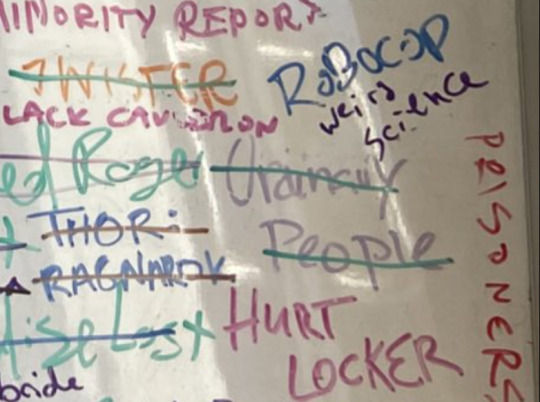
So, in Stranger Things, what could be the hidden central plot? Who could the main character be, even if they are quiet and seemingly passive? What was the true Inciting Incident of this story, the thing that set everything in motion, sparking a burning question that the audience needs answered?
And is Will capable of restoring the balance? Is this his quest - to reclaim his childhood? Is this what he truly wants?
Or is he in fact on a journey towards an 'Ironic' ending, both happy and sad, where he learns that his unconscious desire - what he actually needs - is something else entirely?
And how could the Inciting Incident - being taken - actually turn out to be the best thing that ever happened to him?
Could it, somehow, give him the courage to finally grow and reclaim power over his own life? To turn the Freedom/Slavery axis back to positive? Could Will not only gain the courage to live truthfully, but gain a double positive, and receive the thing he's too hopeless to actually want for himself?
Will thought he wanted to have his childhood back, but perhaps what he secretly wants is to grow up. To grow up into his true actualised self, a gay man, free and able to love and be loved in return.
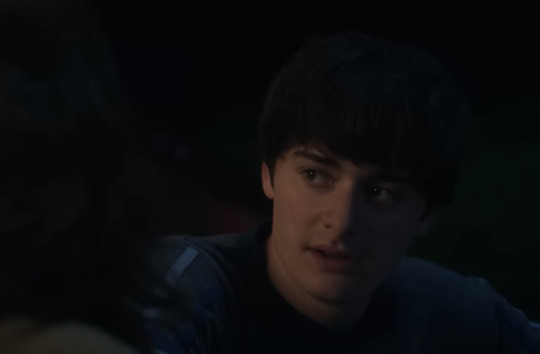
And Mike? If his Inciting Incident was losing Will, then could that also turn out to be the best thing that ever happened to him? Mike says befriending Will was the best thing he's ever done - but that might not have been enough to make him confess his feelings had they both lived relatively normal, untroubled childhoods.
But losing Will? And potentially losing him again in s5?
That might do it.
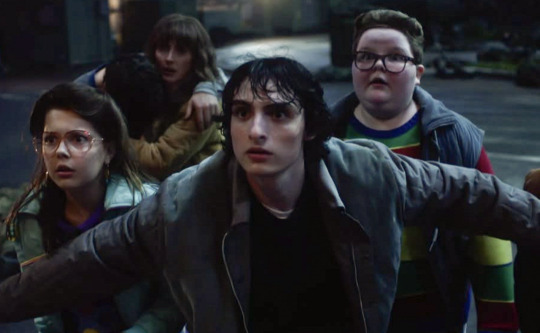
Mike’s quest, his conscious desire, his want, has been to save Will. Maybe it's also to be saved, from his humdrum life.
But perhaps what Mike needs is not just someone to save (Will), or to be saved by (El).
Perhaps, deep down, his unconscious desire is to find the courage to be able to save himself. To be his own superhero, the paladin from his fantasy games. To live a life unchained by the expectations of society - a life of freedom and truth.
Byler has a beautiful symmetry to it not because it’s the restoration of original balance before the Inciting Incident - not because it’s what the characters have spent the entire show thinking they want - but because it has the potential to be the perfect Resolution; the unexpected outcome that neither Mike nor Will consciously let themselves need.
Of course, they would both have to weather terrible losses as well - this will be a bittersweet 'Ironic' ending, after all, and the Obligatory Scene might well be a showdown between Will and Vecna, but Mike and Will coming together romantically would certainly be an event of irrevocable change, something that upheaves the characters’ worlds and not only restores, but renews them, ending their quests and rearranging their lives in a way that the audience knows can never be undone.
In other words, the end of a story.
#stranger things#stranger things 5#st5#inciting incident#byler#byler analysis#byler theory#screenwriting#mike wheeler#mike queerler#mike wheeler analysis#will byers character analysis#will byers#will byers x mike wheeler#byler endgame#stranger things season 5#will x mike#mike x will#will byers main character#will byers is gay#mike wheeler is gay
658 notes
·
View notes
Text
For me sawing elmike in the trailer and not byler doesn't mean they will be together in the end, in fact i see that as a red flag that they WON'T be together at the end !
Because they purposely IDDING Byler here !! We KNOW that Will & Mike will be a pair this season so WHY THEY DIND'T SHOW THEM TOGETHER ?!!
Answer : Byler endgame and platonic elmike <3
This trailer not worried me at all, i have NO DOUBT that Byler will appen, i knew they will not show them to us in the trailer, i knew they will show Milkvan to trick EVERYONE !!!

If I was an angel, I would have lost my wings right there and there.
#stranger things#stranger things trailer#stranger things 5#stranger things 5 trailer#st5#byler#byler endgame#will byers#mike wheeler#byler nation#will byers x mike wheeler#lgbtqia#queer#elmike#platonic mileven#el hopper
38 notes
·
View notes
Text
DO YOU REMEMBER ME ?!
My spy. My builder.
#will byers#stranger things edit#stranger things#will byers edit#stranger things 5#st5#stranger things season 5#will byers main character#will byers has powers
599 notes
·
View notes
Text
Yeah, this scène is DEFINITELY they official break up scene, also the fact that this scène parallele Nancy & Steve tell EVERYTHING we need to know !!
oh the difference is so spectacular to me


#stranger things#byler#byler endgame#mike wheeler#will byers#stranger things 5#st5#byler evidence#byler nation#mike x will#will x mike#elmike#platonic mileven#el hopper
766 notes
·
View notes
Text
when a guy has a best bro and a girlfriend he truly loves at the same time, it looks like this:
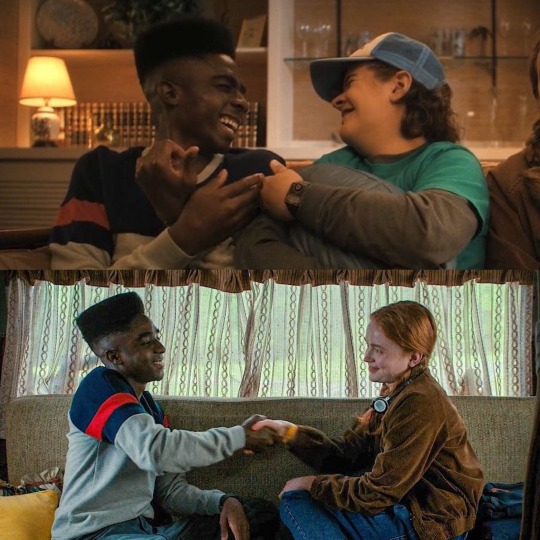
IT DOES NOT LOOK LIKE THIS!!
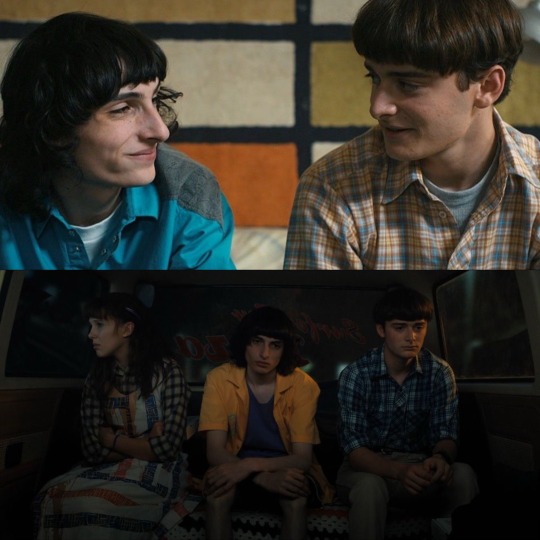
thank you goodnight
4K notes
·
View notes
Text
Okay fuck it imma say it
I feel like one of the big reasons why some people don't ship byler - the ones who aren't that homophobic or ship mileven - is because they infantilise will instead of seeing him on the same maturity level as mike, therefore seeing their relationship as something that will "innocently" wants. something that mike will let him down easy about, something that he needs to grow out of in his coming of age.
I think that's why some people dont see the garage fight as a massive byler proof, because they explain it away as mike being the "mature" one and giving will a reality check.
when you stop fucking infantilising will you actually see that mike is clearly projecting his wants onto will, telling will its ridiculous to want that life, when really its mike who's telling himself its ridiculous. when will admits he wanted to spend the rest of his life with mike, the show isn't going "aw look poor innocent guy misses his childhood", it's going "will is admitting a big truth here that's hard for mike to hear because he also wanted that too"
anwyays ga stop infantilising characters with trauma
#stranger things#byler#will byers#will byers deserves better#mike wheeler#will byers deserves the world#byler endgame
244 notes
·
View notes
Text
I actually don't understand why they defend Milkvan..
I understand why Byler's defend they ship, it's because they have not enough queer/canon/good representation couple in media, so it's understandable for them to activelly defend Byler !
But those who defend Milkvan, i don't. They already have MANY canon and good representation couple to project, in this show (lumax/jopper/jancy even stancy if we believe they have a chance, which i'm not believing personnally) and OUTSIDE this show !!
So WHY ?!! Why defend them ?! The only explanation is what this post comment and the other reblog of this post already say, conformitive and conservative !
saw a TikTok comment that I think deserves to be shared
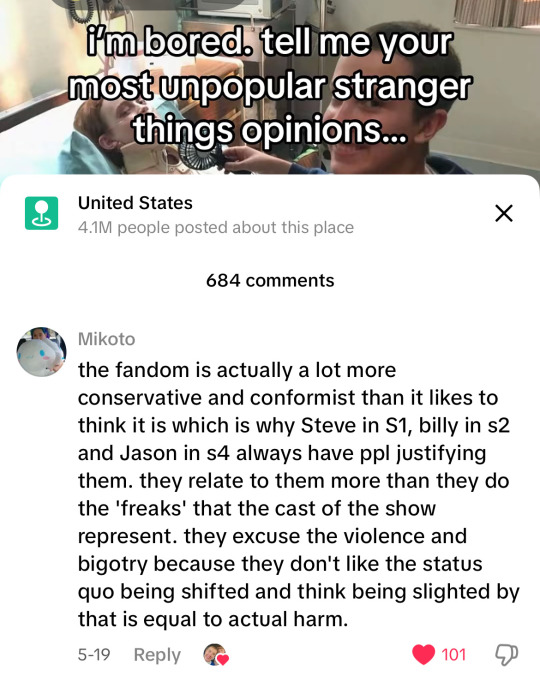
#stranger things#byler#milkvan is bones#these are the same people that say ‘if byler happens it’ll ruin the show’#leave us our two mains characters & best friends become canon lovers ! <3#you already have MANY straight couple to simp of !!#stranger things tumblr#stranger things discourse#byler tumblr#byler brainrot#byler discourse#byler obsessed#byler is endgame#byler nation#byler is canon#byler is real
3K notes
·
View notes
Text
💛💙ATTENTION BYLER FANDOM💙💛
@cee-tinii and i are proud to present:
byler doubt? what's that? - a byler evidence slideshow consisting of cast/crew statements, story/character analysis, and cinematography analysis! anything that could make a case for byler, really.
at time of posting, we have a total of 91 slides. it's still nowhere near a comprehensive collection of byler proof, and there are a few places where we could definitely use some more polishing, but that's where you all come in - we'd love for input and collaboration from the fandom for this collection!
(also please reblog, we'd like to get this slideshow to as many bylers as possible!)
#byler#stranger things#!!!#byler proof#byler endgame#byler is endgame#byler is real#byler canon#byler stranger things#byler tumblr#byler evidence#byler analysis#byler brainrot#byler nation#will byers#mike wheeler
284 notes
·
View notes
Text
I will probably : 1/SCREAM !!!! 2/JUMP !!! 3/PAUSE THE EPISODE !! (basically what you will do)
Guys genuine question, how are y'all gonna react when the kiss pops up on your screen when watching season 5?
Im gonna have to pause the show for like 10 minutes for my brain to process the fact that it actually happened and then actually start to crash out and walk laps around my house as if I didn't already expect this for 3 years
186 notes
·
View notes
Text
OH MAN !! I NEVER SAW THIS PARALLELES IT'S AMAZING !!!
Nothing to see here
Just Mike and Jonathan confessing that for the past year they feel like they've lost Will, like they have let distance (and their own unresolved relationship issues) get in the way and desperately seeking reconnection with him as the world falls apart.














Which could mean nothing, of course.
#stranger things#stranger things parallels#byler#mike wheeler#will byers#jonathan byers#actually it means Mike and Jonathan are going to FIGHT in season 5#because they both want the same thing (to be the person Will comes to in his time of need)#jokes on them because it's going to be joyce
170 notes
·
View notes
Text
.....
At least they recognize that it's a look of love ! <3

THIS IS ABSOLUTELY SENDING ME
#stranger things#byler#byler endgame#byler evidence#mike x will#will x mike#mike wheeler#will byers#thank you milkvan for proving our point !#it's a shame that you are putting it on the wrong person !#denial is a river in egypt#who is delusional now ?!
2K notes
·
View notes
Text
In the end i don't know if i love or hate/ believe or not at the Karen being Alice Creel Theory !
I don't think is gonna happen and i don't think Karen need it to be important (as well as her family) ...but at the same time when i look at the clues, a part of me still like the idea and think that is possible !
Because i still don't understand what's the purpose of the Karen poster for S4, when we have CLEARLY the Creel house in it ! Also, Holly weird physical resembles with Alice, the importance of the Wheelers in S5 and the whole Wheelers family paralleling Creels family !
As well as the fact that we didn't see Alice's corpse well, which could indicate that she might not be as dead as we tought, Brenner be like ! (added to the fact that Henry fainted, so he can't confirm it either)
I... i don't know honestly... it can be interresting ! And VERY F*CK UP IF IT'S TRUE !!! What you guys think ? I genuinely want to know your point of view of it !!
#stranger things#stranger things theory#st5#stranger things 5 theory#stranger things 5#karen being alice creel theory#what do you think ??#wheeler family#creel family#henry creel#alice creel#karen wheeler
8 notes
·
View notes
Text
Someone commented, "How can people say their relationship is toxic? She literally saved his life," under someone's TikTok that highlighted how Mike was willing to sacrifice his own life to spare Dustin's baby teeth (and thus proving the lack of values he has towards himself and his own life) and he would be dead if El wasn't there.
“But she saved him.” Yeah… and that’s exactly why it’s complicated — and why their relationship might not be as healthy as it seems.
Let’s talk about the psychological weight behind this kind of dynamic.
When someone literally saves your life — especially during a traumatic, high-stakes moment — it creates a powerful emotional imprint. The person you associate with relief, safety, and survival can easily become idealized in your mind. But here’s the thing: that’s not the same as love.
The savior complex / emotional debt syndrome
When one person saves another — especially in an extreme (traumatic or life-threatening) moment — it can create a deep emotional debt, where the saved person feels they owe something profound to their savior. This can evolve into a distorted emotional attachment, which is often perceived as love.
Emotional debt ≠ romantic connection
Mike may feel like he owes El everything because she saved him. That sense of emotional debt can evolve into what looks like devotion, loyalty, even “love” — but at its core, it’s about guilt and obligation, not emotional compatibility or genuine desire.
When someone stays in a relationship because they feel they “should,” not because they want to, it creates an imbalance. It’s not real intimacy — it’s emotional submission masked as love.
Gratitude/savior love syndrome
Though not a clinical term, in psychological or romantic literature, people sometimes talk about “savior love,” where the attraction doesn’t stem from real romantic desire, but from a mix of gratitude, admiration, emotional dependence, and relief. This type of feeling can be very intense — but also fleeting — because it’s rooted in a dramatic event rather than a truly built relationship.
The “Savior Complex” and distorted attachment
This is a textbook example of what psychology often refers to as emotional debt attachment or “savior love.” When a person is rescued in a moment of trauma, they might unconsciously attach themselves to their savior, mistaking relief and admiration for romantic love.
It can feel very intense — even destiny-like — but it often fades or becomes damaging once the adrenaline of survival fades and there’s no emotional foundation strong enough to carry the relationship.
Transference
This is an unconscious mechanism where someone projects intense emotions — often linked to important figures from their past (like parents) — onto another person. In this case, the girl who saves becomes an idealized figure, almost a symbolic “savior,” and the love felt isn’t always based on who she truly is, but on what she represents emotionally: safety, life, salvation.
Transference and idealization
Mike might be projecting deep emotional needs onto El — needs for protection, unconditional presence, and safety — especially if his space to explore those needs safely disappeared one day before meeting El. In psychology, this is called transference: when we assign symbolic meaning to someone based on what they represent to us emotionally, not who they really are.
In this case, El isn’t just a person. She’s the girl who saved his life. She’s “the one who pulled him out.” She's a "superhero". And when someone becomes a symbol, not a person, the relationship loses balance. She becomes untouchable, unquestionable — and that is not mutual love. That’s idolization wrapped in trauma.
Post-traumatic emotional confusion
When someone goes through a traumatic experience, the brain seeks symbols of safety to hold onto. The person who was present in the moment of greatest fear — and helped overcome it — can become unconsciously associated with feelings of love, simply because they were the source of relief.
Post-traumatic emotional confusion
Trauma warps emotional perception. When we’re vulnerable, the brain clings to anything that feels like safety. It makes sense that Mike might associate El with peace and survival — but that association doesn’t always translate into a sustainable, reciprocal relationship. It can create a bond rooted in fear, not in freedom.
So yes, she saved him. And that matters. But it’s also part of the problem.
Because "You saved me, so I have to love you" is not romantic — it’s tragic. It’s a trap. It’s the kind of belief that keeps people in relationships that look loyal on the outside but are emotionally repressive on the inside.
Mike deserves to choose love freely — not stay in a relationship because he feels indebted to someone who once saved him. And El, too, deserves someone who loves her for her, not for what she did for him.
Gratitude is not love. Debt is not devotion. And saving someone doesn’t mean they owe you their heart.
In summary: This is most likely a post-traumatic attachment, combined with emotional transference and a sense of emotional debt, all being misinterpreted as love. It’s not necessarily fake or illegitimate — but it’s often an idealized kind of love, born from survival rather than a deep, mutual emotional connection.
If you’re looking for simpler terms to describe it: “Rescue-based emotional attachment” or “post-traumatic gratitude love” can work — even if they’re not official clinical expressions, they’re still meaningful and accurate.
And yes, it can become a toxic relationship, or at the very least unhealthy, if one of them stays out of guilt, debt, or gratitude instead of sincere love or mutual desire.
Here’s why:
Emotional imbalance If he stays out of obligation (because she saved him), and she believes he truly loves her, then there’s a fundamental emotional lie at the core. There’s no balance: one gives out of love, the other out of duty. And even if the intention is good (not wanting to hurt her, wanting to repay what she did), it builds a relationship based on a false premise.
The fear of hurting or “betraying” her He may feel like he owes her his life, and therefore has no right to leave, even if he’s not happy or in love. This chronic guilt can lead to a form of emotional submission, which will make both of them miserable over time.
The myth of “I owe them everything” This is a common mental trap: believing that because someone saved you, you must stay loyal to them for life — even at the cost of your own freedom or inner truth. It becomes a form of perpetual emotional debt that prevents you from listening to what you really want.
Possible consequences:
He may repress his true feelings, or even fall into depression.
She may feel that something is wrong, even if he never says it.
The relationship can become suffocating, built on illusion, and eventually lead to resentment, frustration, or even repressed anger.
The factual and logical consequences I describe here include all the relationships based on this dynamic. But the fact is that every consequence cited here and highlighted is evident and present in season 4 (especially in their argument scenes) speak volumes.
It’s not necessarily toxic at the beginning, but it��becomes toxic if it continues without honesty.
Being grateful is one thing. Sacrificing your truth in the name of that gratitude is another.
Conclusion :
Yes, El did save Mike’s life — and that’s incredibly important. But love born out of a life-saving moment doesn’t automatically make a relationship healthy. In fact, staying with someone because you feel emotionally indebted to them, rather than truly in love, can actually be a sign of an unhealthy or even toxic dynamic.
There’s a psychological phenomenon where intense gratitude, admiration, or even trauma-bonding gets confused with love. When someone saves your life — literally or emotionally — they can become symbolically larger than life to you. You feel like you owe them everything. But that doesn’t necessarily mean you're romantically compatible, or even emotionally fulfilled in the long run. It just means they became a figure of safety during a moment of terror or pain.
If Mike is with El partly because he feels like he has to be, because she saved him, then that’s not a free, mutual love. That’s emotional debt. That kind of imbalance can lead to deep internal conflict — guilt, suppression of real feelings, fear of hurting the other person — and that’s where toxicity begins to seep in, even if no one means harm.
Gratitude isn’t the same as love. And saving someone’s life doesn’t mean they owe you a relationship forever. If a relationship survives solely on the basis of a heroic act from the past — and not on genuine, reciprocal connection in the present — then it might not be as healthy as it looks from the outside.
#stranger things#stranger things analysis#stranger things theory#mike wheeler analysis#mike wheeler mental health#mike wheeler#el hopper#byler#elmike#mileven#Post-traumatic emotional confusion#Rescue-based emotional attachment#post-traumatic gratitude love#Emotional imbalance#The savior complex#savior love syndrome#emotional debt syndrome#romantic connection#Post traumatic#gratitude#idealization#transference
63 notes
·
View notes
Text
Something that I truly believe the GA just won't understand is how much Stranger Things can actually teach you.
Like, we have a plethora of diverse characters and no two people are the same.
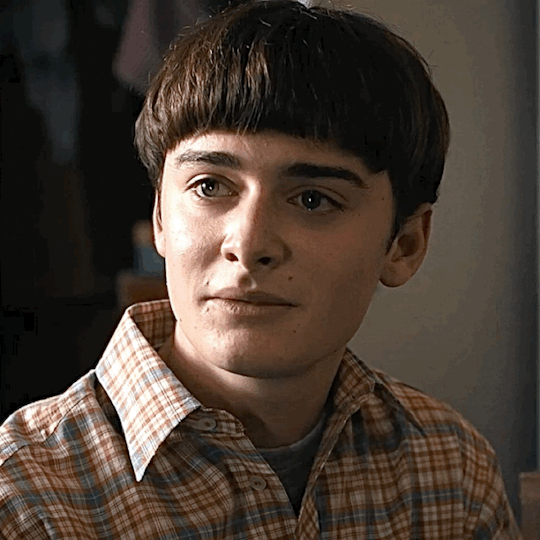
Will is a sensitive person, more so than ANY other character in the show. He cries, he likes to paint, and he loves EVERYONE even when they've hurt him. He's one of the characters who bears a lot of trauma, but he doesn't let it shape who he is. Will is DIAGNOSED with PTSD. God forbid he lets himself cry. He never gets angry at people because of what happened to him, and he always dismisses it if he's going through something. And his biggest problem is Mike 'We're friends. We're friends!' Wheeler.

Joyce is a baddie. She doesn't need no man on her shoulder to be a good mother. When Will went missing, she fought tooth and nail to bring him home even when EVERYONE, even her eldest son, was calling her crazy. She's a leader and she's a character who has so much willpower and doesn't let anything stand in her way.

At first glance, Jim is a fucking asshole. I didn't like him when the series was just starting out. But that's what makes it so good, because he wasn't an asshole for no reason. He lost his KID. And he was given a second chance with El. He can do it better this time and he's going to be there for her as long as he can help it. In season five, I'll expect them to be a separate team from the others. Which is what she deserves. She doesn't need to be with Mike to be an amazing character.
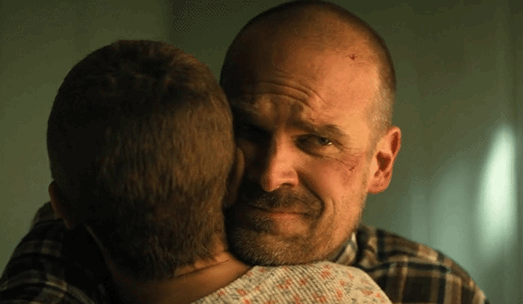
Nancy, Joyce, Robin, and Max are all GREAT examples of women who can lead without some MAN telling them what to do. El can be the same. What she needs is the chance to be independent and learn about herself. Mike can't give her that. She needs to figure that out for herself.
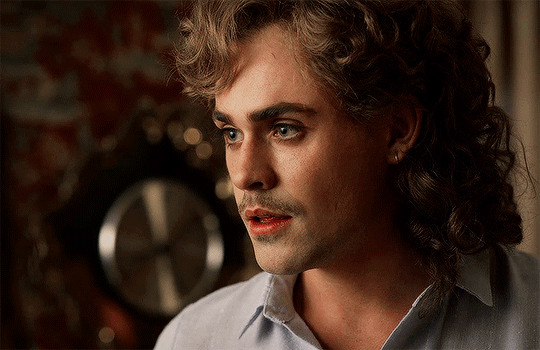
Billy was an asshole. Through and through. There was no excuse for him to be racist towards Lucas, even if he had a bad childhood. Just look at what Will went through, and he's still a fucking angel, so Billy literally has no excuse.
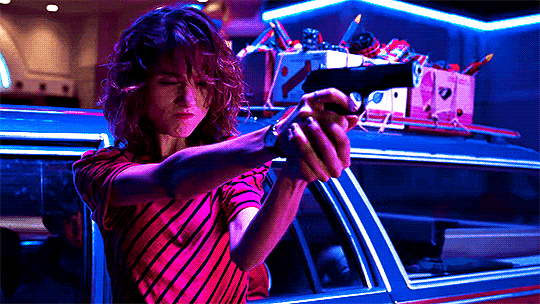
The amount of feminism that Nancy projects is INSANE. She doesn't listen to anybody and when she has an idea she GOES FOR IT. When something bad happens? SHE GRABS A GUN. When someone says she should do something this specific way, it's BULLSHIT and she does it her own way. When the kids are in danger, she puts herself directly in the path of danger.

Mike is one of the most complex characters in the show. He's a natural born leader and goes out of his way to save people. When he first met El, he didn't save her out of LOVE. He did it because he's a protector. Originally, he was going to send her back to the asylum and only let her stick around because she knew where WILL was. And that's what was important. Will. He was hellbent on finding him. In season five, I can GUARANTEE he won't be leaving Will's side. And the only time they'll be separated will probably be because Will is off his rocker this season and too busy fighting internal demons and disappearing all the time.
Because he's been reminded of what's important. And it's not El. She can protect herself. But we know Will can be vulnerable. He doesn't believe he's loved, and that's a good opportunity for Vecna to go after him. Only when he truly starts believing that he is loved will he find the courage to come into his own.
We have so many characters all with different backgrounds. We have mental health, domestic abuse, sexual assault, eating disorders, bullying, homophobia, anger issues, neglect, internalized homophobia, racism, and literal DEMONS FROM HELL.
But you're telling me the GA can't grasp something as simple as two boys falling in love? How emotionally dense do you have to be to be so ignorant?
If you're going to DNF the show just because of Byler, then I'm sorry but you smell like hotdog water and you've missed the entire point of the show. This is about not fitting in. Instead of the protagonists being some..chiseled jocks who are heroric and attractive, we instead have four weirdo nerds obsessed with a game. Four people who are smart as fuck and have been cast out from society and bullied for being different. Especially Will.
And the whole show centers around him. BECAUSE he's different. Growing up and feeling like you don't belong is one of the most difficult things I've ever had to go through. And as a fan of the show since the EARLY days of season one, I can't even begin to describe the happiness I feel when I see Will Byers.
He was not made for you. Will Byers belongs to the people who grew up as a misfit. He belongs to us who feel like mistakes in our own bodies and struggle keeping up with social norms.
Will Byers belongs to US. Not you.
If you have a problem with him because of Noah then I assume you're either a 12 year old who has spent too much time on a screen and not enough time touching grass or you're a 47 year old bald man who doesn't know what common courtesy is.
If you hate on Will just because he's gay then I'm sorry but Stranger Things is not the show for you. Try Riverdale instead. We do not want you here.
Stranger Things is not afraid to put homophobes and racists in their place. Troy pissed himself and suffered a broken arm. Steve got his face ruined and got a redemption arc. Billy literally fucking died. And they aren't afraid to put queers on a pedestal either. To make THEM the important characters. Instead of being sidelined, it's often the queers and the nerds and the people who don't fit in who are given the important roles.
And that's what Stranger Things is all about.
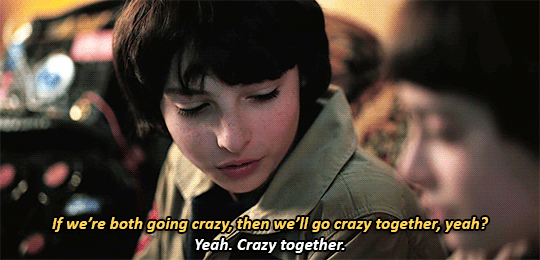
Like it or not, Will is an important character. He deserves this time in the spotlight. When Byler is canon in season five, don't say we didn't warn you. We've been trying to open your eyes since season two.
Byler is the perfect representation of what a HEALTHY and ROMANTIC relationship looks like. Two people are so alike and are quite literally color coded through the whole series and are just so painfully gay for each other it HURTS.
Mil*ven is the perfect representation of what an UNHEALTHY and TOXIC relationship looks like. It's full of arguments, no heart to hearts, NO mutual respect, gaslighting, lying, and literally just zero chemistry.
Over and out.
#stranger things#stranger things 5#st5#byler#byler endgame#byler evidence#byler nation#mike wheeler#will byers#el hopper#joyce byers#nancy wheeler
405 notes
·
View notes
Text
You know why I don't think we'll be queerbaited?
Because the creators have very intentionally dared us to assume that ambiguously queer scenarios will end in a heterosexual way. But they haven't. Every Single Time so far.
They said....Will's disgust at dating and his desire not to grow up could be about his trauma. But it's because he's queer.
They said....Will being upset about his best friend being overly obsessed with his step-sister's relationship could be because he feels like a third wheel and misses his best friend. But it's because he's queer and in love with said best friend.
They said....El's desire for Mike to say that he is in love with him could be because she loves him too. But it's because she is anxiously attached to him and wanted to be reassured she's not a monster.
They said.....Robin being scared to talk to Steve and hating the popular kids could be because her and her friends are seen as nerds and unpopular. But it's because she's queer.
They said....Vickie pausing Fast Times at fifty-three minutes twenty-five seconds could be ignored because she has a boyfriend. But it's because she's attracted to women.
So, what if:
They said....Mike acting cold towards his best friend during puberty and overly obsessed with his girlfriend could be because he is in love with his girlfriend so much more than his best friend. But it's actually because he's queer and has internalised homophobia.
They said....Mike not being able to say I love you to his girlfriend unless he is prompted by his best friend's speech could be because he was afraid to lose his girlfriend and saying i love you would bring that faster. But it's actually because he's queer and not in love with a woman.
They said...Mike and Will sharing a lot of heart-to-hearts, being comfortable with each other, and not wanting to lose each other could be because they're such good friends. But it's because they're in love with each other.
Yes, we've all been queerbaited before.
But with Stranger Things, we've been hetero-baited many more times. This time will hopefully be far less different.
Credit to @therainscene for inspiring me to make this
#stranger things#st themes#byler#byler endgame#byler evidence#byler analysis#byler is canon#byler is real#el hopper#mike wheeler#will byers
588 notes
·
View notes